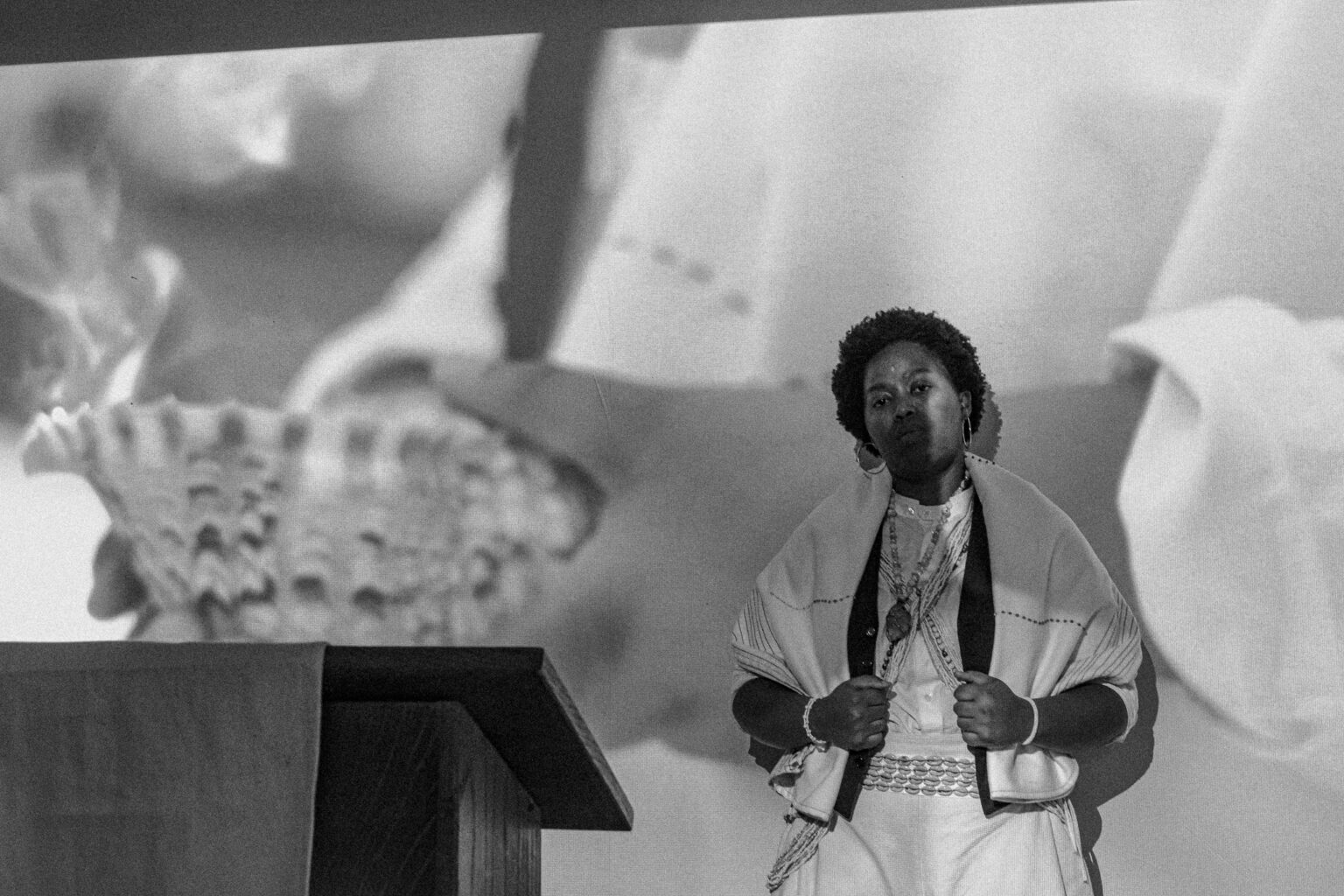By Bukamuso Sebata
It’s been said that “Msaki does not write songs; she catches them”. Born in East London, Eastern Cape, Asanda Lusaseni Mvana, professionally known as Msaki, is a musician, curator, producer, and composer. At this year’s National Arts Festival, the Standard Bank Young Artist for Music returns to the town she grew up in with exhibitions and a performance as part of her journey to fetch younger versions of herself.
Msaki’s exhibition, Ndiyozilanda (I’m going to fetch myself), offers a deeply personal and introspective exploration of her relationship with Makhanda, a town marked by personal and historical traumas. Through her music and artistry, she delves into the layers of violence and rupture that have shaped her experiences, intertwining her story with the broader context of Makhanda’s frontier history. The exhibition serves as a sonic portal for healing, inviting viewers to bear witness and embark on their own journeys of self-discovery.
The gallery space is transformed into a ritual space, setting the stage for Msaki’s immersive exploration. The video installation featuring black and white shots, some in colour, symbolises the past, present, and future versions of herself as she walks between different places alongside Makhosi KHYNSA, a healer and guide well-versed in indigenous technologies. This visual narrative captures the essence of Msaki’s quest for self-healing and connection with her ancestors and her process of fetching these versions of herself.
The exhibition begins with a powerful opening scene, where Msaki walks around the room with a calabash of water, symbolising a sacred act of communication with her ancestors. This act sets the tone for the entire exhibition, emphasising her desire to engage in dialogue with her past, present, and future selves. Through her rituals and conversations with her ancestors, she seeks to find meaning, purpose, and healing for the gift she has been given.
Running through the immersive exhibition is the act of consulting with the ancestors. Those who know, know. It’s in those situations where you go to a sangoma, and they burn impepho (incense). You are invited to take off your shoes and walk around inviting your ancestors into the space, asking for guidance and telling them what’s about to happen.
As the show progresses, Msaki huddles up with her sangoma on a mat, and they sing, play different instruments, and sometimes the audience joins in. Msaki is a singer, and this is one of the ways she accesses her family’s spiritual realm. Her songs are about embarking on a journey to fetch younger versions of herself, trying to forgive herself, finding self-love and humanity, and bringing honour to her family through her craft. “Ndiyozilanda,” she says – “I’m going to fetch myself.”
Central to the exhibition is the notion of being a custodian of her gift. Msaki acknowledges the weight and responsibility that comes with her talent, vowing to hold it with hands that are not soft or grateful but instead hands that will guard it with her life. This declaration encapsulates her dedication to the creative process and her commitment to nurturing her gift through self-reflection and exploration.
As viewers, we become witnesses to Msaki’s transformative journey. The exhibition invites us to reflect on our own personal histories and traumas, highlighting the universality of healing and the power of art to facilitate that process. Msaki’s music, both her existing catalogue and new compositions, serves as a soundtrack to this healing atmosphere, intertwining the past, present, and future in a dialogue that transcends time.
Ultimately, Msaki’s exhibition is a profound and thought-provoking experience. It challenges us to confront our own histories, engage in our healing rituals, and embrace the transformative power of art.
Ndiyozilanda is showing at The Atherstone Room until 2 July.


